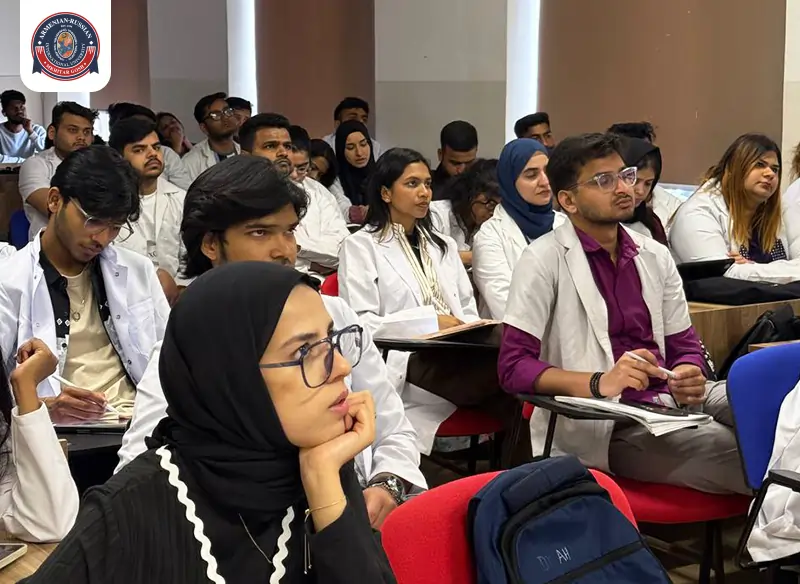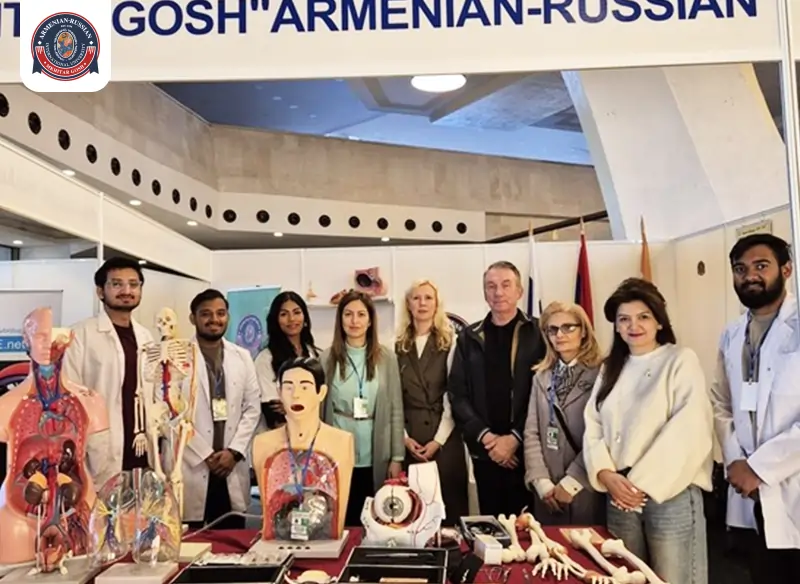
10 Key Traits Of An Ideal Doctor
"Doctors have a big responsibility to bring smiles on the faces of suffering humanity."
Medical profession has been one of the most coveted professions around the world. The dedication to serve humanity and the invincible spirit to make a healthy world give doctors a respectable position in society. The path to success for doctors is not at all easy and requires strong will and determination. When a medical student becomes a doctor, his/her life changes for good. Stepping into the challenging yet worth discovering medical profession is an achievement. But have you ever thought - what qualities a good doctor must possess in order to be a reputed and successful medical professional.
Armenian-Russian International University in Armenia has a world-class MBBS curriculum to help aspiring doctors learn some essential personality traits that will take them to places. The university promotes teamwork and group discussions during the classroom and practical sessions to help students of MBBS in Armenia learn and grow while communicating.
Apart from an enhanced medical knowledge, a doctor must possess some essential qualities that distinguish from others.
1. Good communication skills
From communicating with the patients and their relatives to working closely with the team, good communication skills is something that will be essential for anyone practicing medicine. The skills will be useful to clearly explain the actual condition of patients to their loved ones while being personable and professional. As you will have to work in a multidisciplinary team, you’ll be required to communicate the case details of every patient in a concise and accurate manner.
Very often you might have patients of neuro-degenerative problems, language barriers, or unwillingness to share information with communication disabilities. In such circumstances, you must learn the tactics of extraction and imparting information through them.
2. Teamwork
Doctors always have to work in a team to provide the best medical care possible to the patients. Medical fields comprise interdisciplinary teams including nurses, physiotherapists, healthcare assistants, etc. The skills of collaboration and teamwork becomes a vital part of the medical profession and it will only help doctors to grow their knowledge and skills by working closely in a team.
In case of disagreement on certain matters, you must learn how to put your point across and raise your concerns in a professional and polite manner.
3. Confidence
Shaking hands and lack of confidence indicates a shortcoming of a doctor. Every patient looks for an experienced doctor when it comes to seeking medical treatment. Nobody wants to reach out to a doctor who is not confident about his profession and fears practicing his knowledge on his/her patients.
A good doctor must be highly knowledgeable when it comes to providing treatments or dispensing advice. Any person becomes a genuine doctor when he/she can win the confidence of the patients with his/her confidence. Patients want to trust their doctors but lack of self-assurance hints at uncertainty. Any physician with a strong sense of confidence will be heard and respected by colleagues and patients.
4. Empathetic and compassionate
Who is an ideal doctor? Someone who understands the pain of the patients, listens to their problems, and treats them with professionalism. Although the medical profession never states that doctors must build an emotional bond with the patients, however, as this profession demands dealing with humans, it is important to be considerate and empathetic towards the patients.
The most fundamental duty of a doctor is to serve people in their illnesses and you can only achieve that if you want the welfare of your patients. Medical knowledge makes doctors good at curing patients but compassion is what makes them good doctors. As you’ll be a witness to the most vulnerable points of your patients and they must know that you care about them.
5. Leadership
At some point in time in your medical career, you’ll be taking charge of your department. That is the time when you’ll be leading and directing your team and will be making all the required decisions. The role attracts major responsibilities and you need to be confident before you give directions to your team members. As a leader, you must ascertain and understand the qualities of your team members and utilize their individual strengths and skills in the treatment of the patients. While performing the roles and duties of a leader, you should be approachable by your team members rather than authoritative.
6. Ultimate organizational skills
The life of doctors is never limited to a cubicle. It goes much beyond that. From attending multiple patients at lengths with normal to severe illnesses to taking care of the documentations and meetings, sometimes the job of a doctor overwhelms you. Imbibing good organizational skills and prioritizing your tasks based on their urgency will make your duties as a doctor much easier maintaining the quality of patient care without any compromises. Organizational skills inculcate an alert mind in a doctor so that they don’t lose track of their patients in times of work overload.
7. Good medical knowledge
Encyclopedic theoretical medical knowledge becomes the base in the journey of becoming an excellent doctor. Keeping at pace with the latest news and trends in the medical field and recalling your medical studies at the time of treatment of patients becomes essential to provide the right medical treatment to your patients. Having a good grasp on all the medical lessons of your medical specialty is something that will take you places in your medical career. Utilize your medical knowledge in curing your patients to save their lives.
8. Strong work ethics
When anyone decides to be a doctor, he is keeping others over him/her. Building strong work ethics means complete dedication keeping yourself and your personal life to the side. The duties of a doctor have no limits and if anyone prefers to work in a 9 to 5 job, then medicine is not their cup of team. Long working hours, working weekends and holidays, etc. can sometimes overwhelm you but remembering your motive of service to humanity is the key to regain strength. Prioritizing your work above all is what the medical profession demands.
9. Stress management skills
Stress has become a common health symptom for people nowadays. Someone or the other is dealing with stress in different ways. Lack of sleep, work overload, hospital issues, patients’ deaths, little down time, etc. add to the mental pressure for doctors. Having good stress management skills help doctors to deal wisely in such situations and avoid affecting their treatments.
10. Professionalism
Professionalism is an inevitable part of the medical profession. It requires doctors to be courteous, polite, well-presented, and attentive while on their jobs. Such a quality enhances their communication and interpersonal skills and helps them maintain a high standard behavior while at work.
Not just one but an excellent doctor must possess all-of-the-above qualities to make big in the medical field. It is essential to display all these attributes in some way to be a good doctor. Be open to the suggestions from your teammates, feel the pain of your patients, and never stop learning from your mistakes.
.png)


